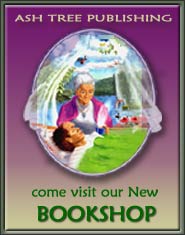(Part 2)
Justine: When you talk to women, you really
talk to them about taking responsibility for their own health
and well-being. I mean it’s not just following you,
but it’s like empowering women to take back their own
initiative.
Susun: Exactly. And one of the ways that
I do that is by talking about the Three Traditions of Healing.
I think that health care’s very confusing and it’s
confusing for us simply because there’s so many choices.
You know, you have a headache. What do you do? Take an Aspirin.
Call your acupuncturist. Do yoga. Get out the aromatherapy.
You know, so many different possibilities. So to try to make
it easy for myself to figure out what was going on, I realized
that I could broadly lump different modalities into these
three traditions, which I call the Scientific Tradition, which
is linear, measures and then tries to fix so that we become
normal within the limits of those measurements; the Heroic
Tradition, which says that we are responsible for everything
that happens to us, and anything bad that happens to us is
basically the result of toxins, filth and bad behavior; and
the Wise Woman Tradition, whose symbol is the spiral, who
says that while we are responsible, it is a co-creative universe.
So it’s raining today, and we both got wet.
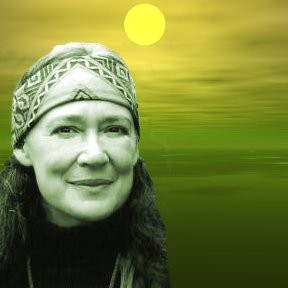 Justine:
Right.
Justine:
Right.
Susun: Right. Not because we did anything
wrong, but because it is raining. So in the Wise Woman Tradition,
we heal by nourishing the wholeness of the individual in creative
concert with the universe.
Justine: So the key word there is looking
at the wholeness of the individual, not just taking out a
specific part and just looking at that.
Susun: Now, I question how we can feel whole
if we are divided into body, mind and spirit.
Justine: Ah! Ah!
Susun: Have you ever thought about something
that had no effect on your body? Everything we think has an
effect on our body, alright? And what we feel and how we acknowledge
and work with the presence of spirit in our lives, no matter
what we call that, all of that has a physical effect. Anything
we do physically -- we talk about like runner’s high,
alright? -- so what we do physically impacts on mind and our
emotions and they’re all interrelated. And that’s
what the Wise Woman Tradition is about. It says that the sum
of the parts is not the whole, but that the whole is more
than the sum of the parts.
Justine: There’s something that I
do every day. I check in with my mind/body/spirit. So when
I do that, it’s differentiating between like if my knee
is hurting, that’s not all of who I am so to say, “OK,
my knee is in pain. My mind is clear and curious, and my spirit
is soaring” so that we don’t --
Susun: You’ve divided yourself into
three parts.
Justine: I have divided myself into three
parts.
Susun: And so you’re no longer whole.
Justine: Ah!
Susun: And that’s what I’m saying.
Justine: Yes.
Susun: As a matter of fact, you’ve
already disintegrated your wholeness by making your knee different
than you. So the wholeness that I am right now, is experiencing
pain in my knee. In what way can I nourish myself so that
this pain in my knee becomes a doorway to a greater hologram?
So I’m not talking about wholeness; I’m talking
about holographic wholeness. And when we make a hologram the
entire hologram shows us a picture. And if we were to cut
it in half we would see the same picture.
Justine: Exactly. It would be like the whole.
Susun: The whole. Exactly. You can’t
take any one part of a hologram and say it’s just a
knee. Any one part of it reflects all of the wholeness at
any one time. So I would say that if there’s a pain
in your knee, that that is not a pain that is simply located
in your knee, but a pain that is reverberating throughout
all of you, and that then gives you and I, an opportunity
to see where the whole that creates wholeness, health and
wholiness is. And through that whole, nourishment can arrive.
Justine: So it’s a re-reading of that
whole then. Would that be--
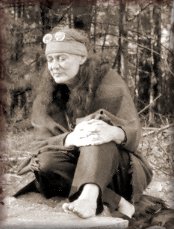 Susun:
Well the whole itself, the w-h-o-l-e, the whole of our pain
or our problem is the opening for health.
Susun:
Well the whole itself, the w-h-o-l-e, the whole of our pain
or our problem is the opening for health.
Justine: OK so we want to go through that
opening?
Susun: Yeah. In other words, in the Wise
Woman Tradition we don’t seek to cure diseases, to eliminate
pain or to solve problems. Because my understanding is that’s
what we’re here for.
Justine: To solve problems?
Susun: To have problems.
Justine: To have problems <laughs>.
Susun: <laughing> To hang out in that
landscape of difficulty huh?
Justine: Let’s talk more about that
landscape of difficulty in just one moment. I’m speaking
with Susun Weed, author of The New Menopausal Years the Wise
Woman Way. My name is Justine Toms, you’re listening
to New Dimensions.
[break]
Justine: I’m here with Susun Weed,
author of New Menopausal Years the Wise Woman Way –
Alternative Approaches for Women 30 to 90. Now that’s
a new idea, that we think of menopause just as this one particular
point in life and you’re saying that it’s a long
period of time. Tell us about that.
Susun: Well actually what I’m saying
is that taking care of our health is something that we can
do every day. But tell me, was puberty the day that you found
the first drop of blood in your underpants, Justine.
Justine: No, no.
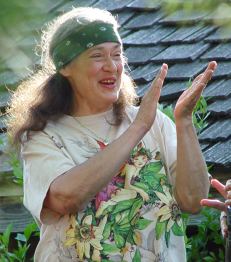 Susun:
Well of course, medically menopause is defined as the last
drop of blood that a woman sheds. But of course, that’s
no more menopause to a woman than puberty is that one day.
Puberty was a period of time during which as I say, you underwent
the changes that made your 15 year old self vastly different
than your 8 year old self, yes?
Susun:
Well of course, medically menopause is defined as the last
drop of blood that a woman sheds. But of course, that’s
no more menopause to a woman than puberty is that one day.
Puberty was a period of time during which as I say, you underwent
the changes that made your 15 year old self vastly different
than your 8 year old self, yes?
Justine: That’s right.
Susun: And not just your body huh?
Justine: That’s right.
Susun: But every single part of you.
Justine: The whole kit and kaboodle.
Susun: The whole right. So similarly with
menopause. Menopause is that period of time during which we
change and we become as different after menopause compared
to before menopause as we were after puberty compared to before
puberty. The biggest difference of course, is that 10, 11,
12, 13 whatever age we hit puberty, we didn’t think
we were supposed to be in control. I often say to people,
“What herbs did you take for puberty?” and they
give me this kind of blank expression and then smile and say,
“Well, nothing”. And I say, “What makes
you think that you need to take anything at all for menopause?”
Menopause is puberty prime, alright? One of the reasons I
think that puberty gets a little more respect is that both
men and women go through it. And men don’t go through
menopause. And so in a way it’s a very special woman’s
issue, something that in fact so far as we know, no other
female species on this planet goes through, is menopause.
Now Kristen Hawkes who works at the University of Utah and
studies hunting/gathering cultures, especially the Hadza,
has found that women in their 60s, 70s and 80s are the most
productive members of these communities. I mean, they out-produce
the men, the teenagers, and women of any younger age. I often
talk about getting through the frumpy 50s and into the scintillating
60s. As a matter of fact Kristin Hawkes goes further. She
says that menopause is as critically important as a big brain
and an upright posture in making us fully human.
Justine: Now you made a statement that no
other species even other mammals go through this.
Susun: So far as we know. No-one else. No
other species goes through menopause. Right.
Justine: So in other words, let’s
say dogs or horses. They can continue to give birth to the
end of their lives.
Susun: Exactly.
Justine: So they don’t have this pausing
in being able to give birth. So you’re saying --
Susun: Dr Kristin Hawkes is saying is that
this cessation of our birth giving allows women then to live
another 50 years, because the hormone that is responsible
for ovulation is no longer produced, and that hormone unfortunately
is a hormone that cancer cells love. So we’re born,
as women, making 29 out of the 30 estrogens that we can make.
We’re not born without estrogen. If we were born without
estrogen we would’ve been called Dick or Peter, right?
So we got our girl’s names; that proves we were producing
estrogens. In fact, we produced it in our mom’s uterus.
At puberty however, the 30th estrogen gets turned on. That’s
called the stradiol – or estradiol – and that
estrogen is stronger than all 29 others combined. Now one
of the things that we find in the Scientific Tradition –
we talked about how in the Wise Woman Tradition the whole
was greater than the sum of its parts. In the Heroic Tradition
the whole is the sum of its parts – body, mind and spirit.
In the Scientific Tradition the whole is equal to the most
active part. So even though you and I and every other woman
produce 29 kinds of estrogen every single day of our lives,
we are told that we stop producing estrogen at menopause.
Which is not true.
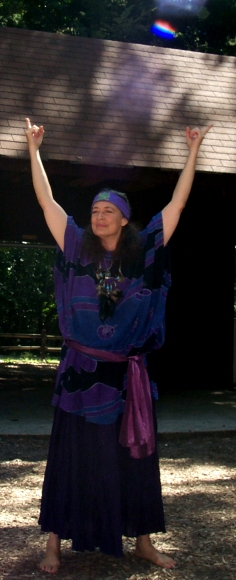 Justine:
So we continue to produce estrogen even --
Justine:
So we continue to produce estrogen even --
Susun: 29 kinds of it.
Justine: In our 70s, 80s, 90s.
Susun: You got it. Right till <inaudible>.
Justine: But there’s just one estrogen
that --
Susun: Powerful one. Turns on puberty and
off at menopause.
Justine: Off at menopause.
Susun: Right? And it is to cancer as kerosene
is to fire. Does kerosene cause fire?
Justine: No.
Susun: No. Kerosene doesn’t cause
fire and estradiol doesn’t cause breast cancer. And
you know, scientists – and I love ‘em for it –
are very specific about words. Ordinary human beings are not
so specific about words. So when they say, “Oh, chemicals
cause cancer” and scientists say, “No it doesn’t”,
well it doesn’t. But estradiol, and certain chemicals
which act like estradiol, can promote or feed cancer.
WOMEN'S
HEALTH:THE WISE AND NATURAL WAY
Audio tape , 1 hr.
Today, Susun Weed is one of America's foremost authorities
on herbal medicine and natural approaches to women's health.
Susun engages in a fascinating, candid and controversial dialogue
about women's health, natural healing and the "wise woman"
tradition. Susun exposes the illusion about menopause and
hormones, addresses the HRT/cancer connection and shares information
about bone density. She reveals her knowledge about powerful
anti-cancer herbs, and how to prepare herbal infusions with
reverence. (Interview hosted by Justine Toms). Topics explored
in this dialogue include: seeing yourself as a hologram keeps
you healthy; herbal infusions, how they fully nourish your
body; and, the six steps to personal healing.
Susun Weed's complete
interview is available from Ash Tree Publishing
Mail $12 to Susun Weed PO Box 64 Woodstock, NY 12498
or order online at www.wisewomanbookshop.com

 Justine:
Right.
Justine:
Right. Susun:
Well the whole itself, the w-h-o-l-e, the whole of our pain
or our problem is the opening for health.
Susun:
Well the whole itself, the w-h-o-l-e, the whole of our pain
or our problem is the opening for health. Susun:
Well of course, medically menopause is defined as the last
drop of blood that a woman sheds. But of course, that’s
no more menopause to a woman than puberty is that one day.
Puberty was a period of time during which as I say, you underwent
the changes that made your 15 year old self vastly different
than your 8 year old self, yes?
Susun:
Well of course, medically menopause is defined as the last
drop of blood that a woman sheds. But of course, that’s
no more menopause to a woman than puberty is that one day.
Puberty was a period of time during which as I say, you underwent
the changes that made your 15 year old self vastly different
than your 8 year old self, yes? Justine:
So we continue to produce estrogen even --
Justine:
So we continue to produce estrogen even --
